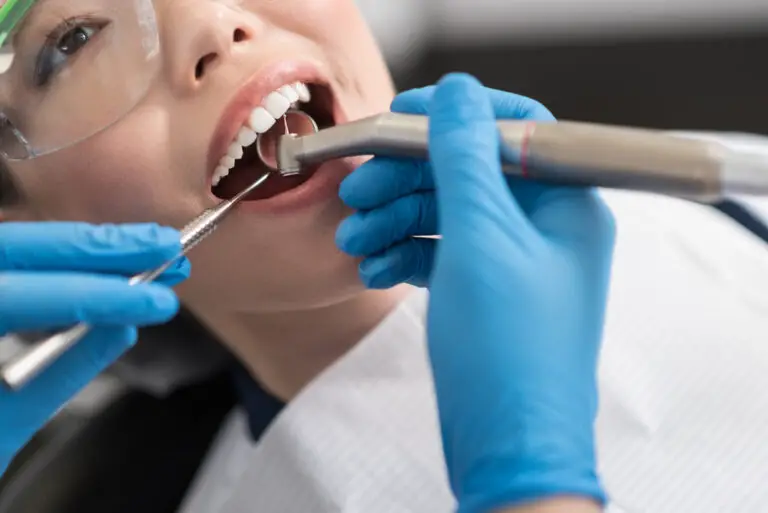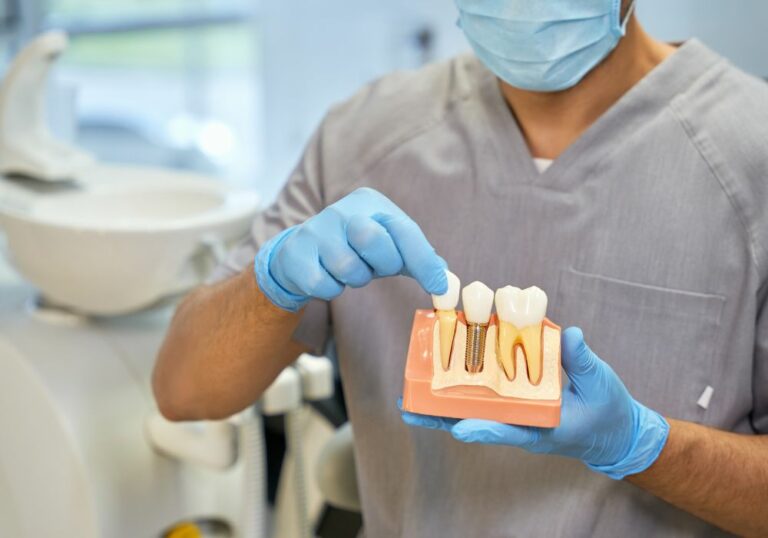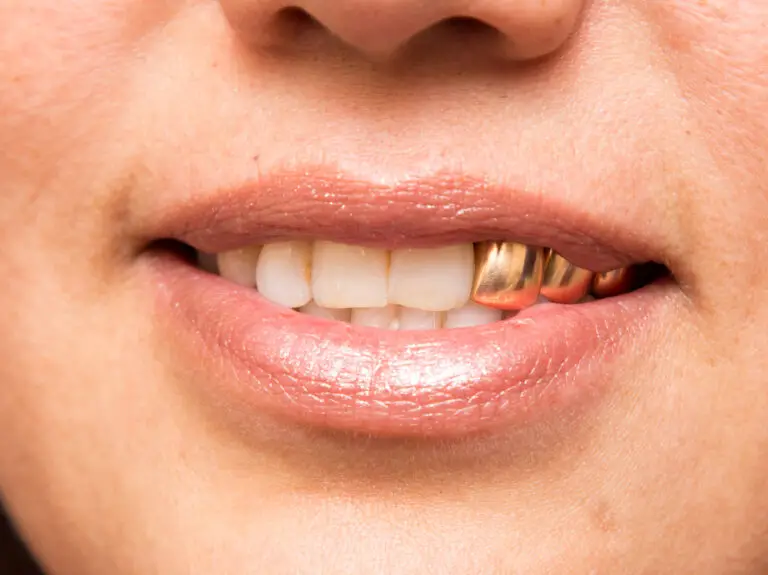Noticing blood suddenly emerge from your teeth or gums can be alarming. However, some bleeding from the gums is quite common and usually not indicative of a major problem. There are a number of potential reasons why someone might see blood when brushing, flossing, eating, or spit out blood from their mouth. Identifying the specific cause and origin of the blood is important in determining the appropriate treatment.
This article will explore in depth the various sources of bleeding from the mouth, risk factors, when to seek emergency care, preventative steps, and provide answers to frequently asked questions.
Where does the blood originate?

Pinpointing where blood is coming from in the mouth is helpful to diagnose the issue. Potential sources include:
- Gums: The gums or gingiva surround the base of the teeth. Bleeding from the gums is often related to gingivitis or gum disease. However, gum irritation, canker sores, trauma, or hormonal shifts can also cause localized bleeding in the gums.
- Between teeth: Blood originating between teeth likely indicates inflammation or gaps between the teeth where food debris and plaque build up. Flossing typically dislodges this blood.
- Roof of mouth: The palate has a rich blood supply. Ulcers, irritation from dentures, canker sores or trauma can lead to palate bleeding.
- Tongue: The tongue’s surface often bleeds readily when irritated. Cuts, bites, abrasions from sharp foods or oral piercings can cause tongue bleeding.
- Lips: Cracked, chapped or irritated lips often bleed a bit with motion. Lip piercings can also bleed.
- Throat: Strep throat, tonsillitis, throat ulcers or irritation from intubation can provoke throat bleeding.
Pay attention to where in the mouth blood originates as it provides insight into the possible cause. Bleeding from multiple areas likely indicates a systemic issue.
Causes of Blood from Teeth
There are a range of possible reasons someone may spit out blood or notice blood on their toothbrush. The most common include:
Gingivitis
Gingivitis refers to inflammation of the gums from a bacterial infection. It develops when plaque, a sticky film of bacteria, accumulates on teeth, especially near the gumline. The plaque causes infection and swelling.
In early stages, gingivitis causes:
- Gums that are red, puffy and bleed easily
- Bad breath
- Gums that are tender and irritated
As gingivitis worsens, gums can become extremely inflamed and bleed readily with normal brushing. untreated, it can progress to advanced gum disease.
Treatments for gingivitis:
- Improve oral hygiene – gentle flossing, brushing
- Professional cleaning to remove plaque below gumline
- Antimicrobial mouthwashes to reduce infection
- Address habits like smoking that worsen gum disease
Periodontitis
Periodontitis refers to inflammation of both the gums and deeper structures that support the teeth, like the periodontal ligament and jawbone. It represents advanced stages of gum disease.
Periodontitis arises when:
- Plaque spreads deep below the gumline
- The immune system launches a damaging inflammatory reaction
- Gums detach from the teeth, forming infected pockets
- Jawbone and tissues break down
Common symptoms include bleeding with brushing, sore gums, bad breath, painful chewing, loose teeth and receding gums.
Treatments for periodontitis:
- Deep cleaning below the gumline
- Antibiotics or antimicrobial rinses
- Flap surgery to clean tooth roots
- Bone grafts in cases of bone loss
- Tooth removal if beyond saving
Vitamin deficiency
Low levels of vitamins that help maintain healthy gums and assist with proper blood clotting can make the gums prone to bleeding. Vitamin C deficiency makes gums weak. Vitamin K deficiency impairs the blood’s ability to clot.
Treatments for vitamin deficiencies:
- Increase vitamin C intake – citrus fruits, tomatoes, strawberries
- Eat more vitamin K foods – green leafy vegetables, dairy, eggs
- Take supplements to restore normal vitamin levels
Blood clotting disorders
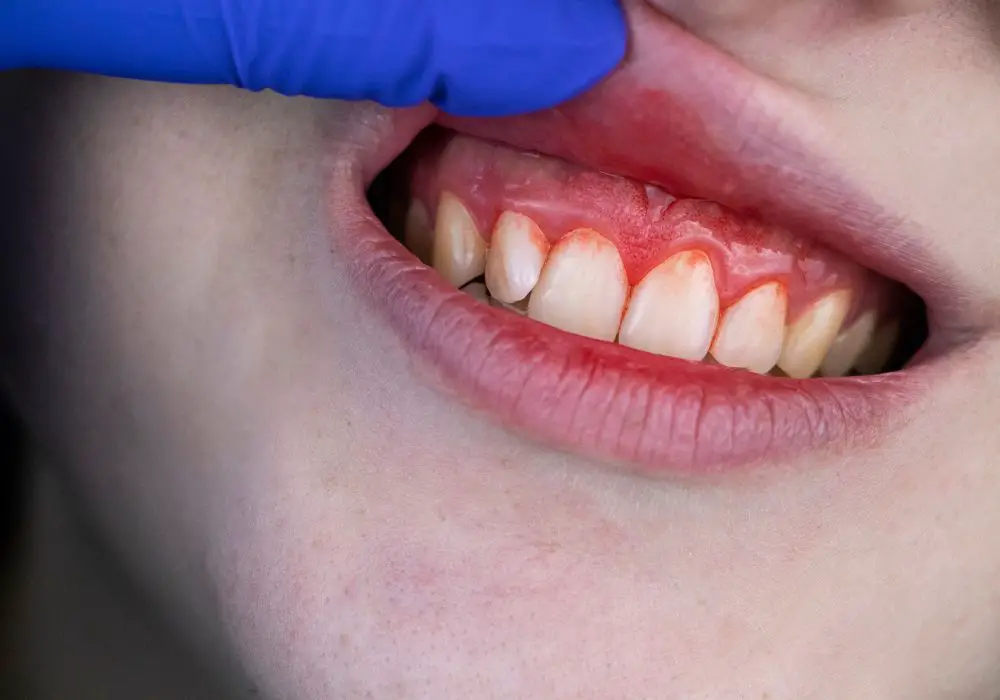
Disorders that affect the blood’s ability to form clots normally, such as hemophilia or von Willebrand disease, can cause increased bleeding even from minor gum irritation. Those with clotting disorders often have excessive bleeding from small cuts and wounds.
Treatments for blood clotting disorders:
- See a hematologist for diagnosis and treatment
- Use tranexamic acid rinses to promote clotting before procedures
- Get genetic testing for inherited disorders
Drug effects
Some medications make people more prone to gum bleeding by affecting platelet function or clotting ability. These include:
- Blood thinners like warfarin, heparin and clopidogrel
- Anti-inflammatory drugs – aspirin, ibuprofen
- SSRIs for depression
- Some supplements like fish oil and turmeric
Managing drug effects:
- Scale back brushing if prolonged bleeding
- Use waxed floss that slides through tight contacts
- Apply pressure with gauze until bleeding stops
- Monitor bleeding and report to doctor
Pregnancy
Hormonal changes during pregnancy can inflame the gums and make them more likely to bleed, even with gentle brushing. Pregnancy gingivitis affects up to 70% of pregnant women due to increased progesterone and estrogen.
Treatments during pregnancy:
- Maintain oral hygiene routine
- Get professional cleanings
- Use pregnancy-safe antimicrobial rinses
- Report bleeding to obstetrician
Puberty
Puberty also causes shifts in hormones that can increase gum sensitivity and susceptibility to bleeding. Teens may experience gingivitis symptoms even with good oral hygiene.
Treatments for teens:
- Brush and floss gently
- See a dentist regularly
- Rinse with antimicrobial mouthwash
Cancers
Oral cancers, leukemia, and other blood cancers can manifest with gum bleeding, oral lesions and excessive bruising. Bleeding may be severe.
Treatments for cancers:
- Treating the underlying cancer – chemo, radiation, bone marrow transplant
- Managing oral infections
- Avoiding unnecessary dental work
Injury
Any trauma to the gums and mouth tissues can cause localized bleeding at the site of injury. Common sources include:
- Vigorous brushing with a stiff brush
- Flossing too aggressively and cutting the gum
- Eating crunchy, sharp foods that poke the gums
- Dental procedures like tooth extraction
Bleeding from injury is typically mild and subsides quickly once the irritation is removed. Rinsing and applying pressure helps stop the bleeding.
Warning Signs to Seek Urgent Dental Care
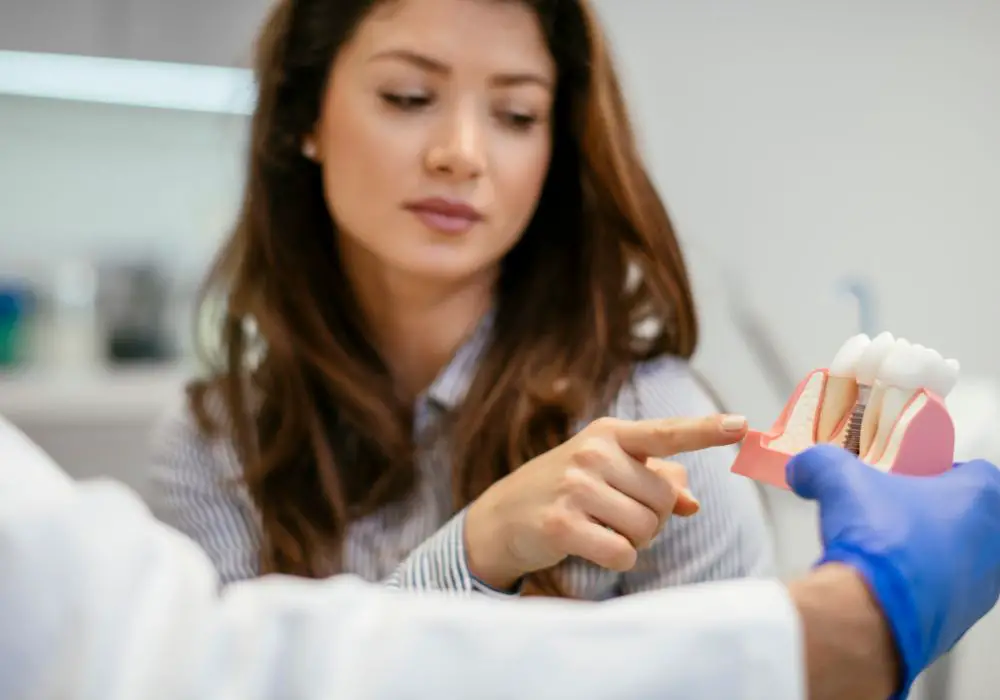
Occasional minor bleeding of the gums, such as when flossing or eating spicy foods, is not uncommon. However, some signs warrant prompt dental evaluation, including:
- Bleeding that lasts longer than 10-15 minutes
- Frequent bleeding with daily oral hygiene
- Bleeding along with loose teeth or toothaches
- Heavy bleeding that is difficult to stop
- Large blood clots when bleeding
- Foul taste from blood
See a dentist right away if gum bleeding is accompanied by:
- Severe tooth or jaw pain
- Persistent sores or lesions
- Swelling in the gums or face
- Feeling ill or feverish
These may be signs of a dental abscess, oral cancer or other condition requiring urgent treatment.
Prevention Tips
Practicing good oral hygiene is key to preventing gum irritation and overgrowth of bacteria that can cause bleeding. Prevention tips include:
- Brush properly: Gently brush along the gumline in a circular motion. Use a soft-bristled toothbrush. Avoid aggressive scrubbing.
- Floss daily: Floss gently every day to clear plaque between teeth. Use waxed floss if you have tight contacts.
- Rinse with antimicrobials: Use mouthwashes with cetylpyridinium chloride or essential oils to reduce bacteria.
- Get professional cleanings: Have a dental cleaning every 6 months to prevent plaque buildup below the gumline.
- Quit smoking: Smoking worsens gum disease and promotes infection.
- Drink water: Stay hydrated to keep the mouth moisturized, which promotes gum health.
- Limit sugary foods: Sugar feeds the bacteria that inflame gums. Reduce frequency of snacking.
- Use a humidifier: Keeping air moist with a humidifier prevents dryness that can irritate gums.
When Bleeding Warrants an ER Visit
Though alarming, gum bleeding is rarely a medical emergency. In most cases, home treatment and seeing a dentist during normal business hours are appropriate. Go to the emergency room if:
- Bleeding is severe and unstoppable with pressure
- Bleeding causes dizziness, lightheadedness or fainting
- Difficulty breathing or swallowing due to blood
- Vomiting blood from the mouth
- Facial bruising or severe jaw swelling develops
Uncontrolled bleeding in the mouth warrants emergency medical care, as breathing may be compromised. Seek help immediately if concerned.
FAQs about Bleeding Gums
Is it normal for gums to bleed a little when I brush?
It is fairly common for gums to bleed mildly when brushing, especially if brushing too hard. But consistent, heavy or prolonged bleeding is not normal and usually indicates unhealthy gums. See your dentist if it persists.
What is the best way to brush if I have bleeding gums?
Brush very gently with a soft brush in a circular motion when you have bleeding gums. Avoid the specific areas that tend to bleed readily. An antimicrobial mouthwash can help reduce infection without abrasion.
Should I avoid flossing if my gums bleed when I floss?
No, it is important to keep flossing daily even if your gums bleed a bit. Bleeding indicates plaque and bacteria are present between teeth and need to be removed. Floss gently and carefully when your gums are inflamed.
Can certain foods or drinks cause gums to bleed?
Yes, foods with sharp edges like chips or acidic foods like citrus can irritate gums and cause minor bleeding if gums are inflamed. Alcohol and carbonated beverages can also provoke bleeding in sensitive gums.
How can I stop gum bleeding at home?
To help stop minor gum bleeding, apply direct pressure using gauze or a moist tea bag. Rinsing with cold water constricts blood vessels. You can also use hydrogen peroxide rinses. Avoid hot liquids as they dilate blood vessels.
Conclusion
Noticing blood from your gums or oral tissues can be jarring but is rarely an emergency. Proper oral hygiene, routine dental visits and avoiding injury or irritation to the gums reduces common causes of bleeding like gingivitis. Seek prompt medical care if bleeding is excessive, prolonged or accompanied by concerning symptoms. Addressing any underlying health issues and taking preventative measures helps keep your gums and smile healthy.



